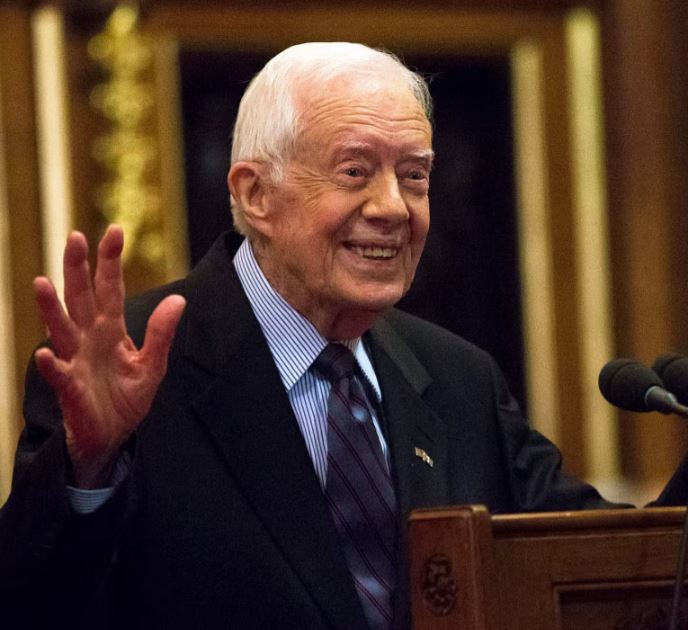Jimmy Carter, the oldest surviving American president at 100, passed away on December 29 leaving the world with the legacy of morality, decency, and social responsibility. Such enduring values have eluded all his successors—Republicans and Democrats alike, as the political discourse has degenerated into name-calling, partisanship and winning at any cost. It is, therefore, not an exaggeration to refer to Jimmy Carter as the last American moral president and a statesman. The last adjective summarises his work during his entire life, particularly the 44 years of post-presidency contributions throughout the world.
I first came across Jimmy Carter when he was running for president. A simple man who carried his own garment bag, stayed in small hotels, and would surprise commuters in train and bus stations with a simple statement—”Hi, I am Jimmy Carter, and I am running for president.” Most people were not familiar with the one-term governor of Georgia and would walk away. I did stay around and was impressed with the simplicity of his demeanour and clarity of what he wanted to achieve. He, of course, went on to be the 39th president of the US but the “Iranian Hostage Crisis” and inept handling of the economy made him a one-term president.
During his term of office, he brought Israeli Prime Minister Menachem Begin and Egyptian President Anwar al-Sadat together to Camp David which resulted in the first peace treaty between the two countries and indeed the Middle East. The treaty has indeed withstood the test of time. However, Carter became unpopular with the current generation of Israeli leaders when he compared the treatment of Palestinians with apartheid in his book Palestine: Peace Not Apartheid.
Americans, however, must not overlook some of the pivotal legislations and regulations that took place during the Carter presidency. Today minorities including women have access to home loans and other forms of credit due to the vigorous enforcement of the Equal Credit Opportunity Act by Carter administration. President Carter also brought about airline deregulation which allows millions of Americans to avail cheap airline tickets today. He was also responsible for the passing of the Foreign Corrupt Practices Act which prohibits US citizens and businesses from bribing foreign government officials to benefit their business interests. During his presidency, US Justice Department sent high-level executives to jail for such acts. What a contrast to today’s politics, business, and their leaders.
President Carter’s life after his defeat to Ronald Reagan serve as a shining example of what can be achieved even without the power of presidency. He embraced the mission of Habitat for Humanity and worked tirelessly to provide affordable and safe housing for the needy throughout the world. In addition to raising millions of dollars for the not-for-profit organisation, he and his wife physically joined volunteers in building houses in both ghettos and remote rural areas. His physical work alongside others was not photo-op situations but full days of manual labour for weeks at a time.
President Carter was an advocate of peace and believed that all conflicts could be resolved through peaceful negotiations. During his term of office, he brought Israeli Prime Minister Menachem Begin and Egyptian President Anwar al-Sadat together to Camp David which resulted in the first peace treaty between the two countries and indeed the Middle East. The treaty has indeed withstood the test of time. However, Carter became unpopular with the current generation of Israeli leaders when he compared the treatment of Palestinians with apartheid in his book Palestine: Peace Not Apartheid.
Jimmy and Rosalynn Carter established the Carter Center at Emory University with the vision of peace and human rights and for the past four decades initiated various programmes to empower and improve the lives of the world’s poorest and most forgotten people. Through a variety of programmes and partnering with various organisations throughout the world, Carter Center’s achievements include—helping to monitor elections in newly independent countries and advocate for human rights; reducing incidence of communicable disease including eradication of Guinea worms; helping to establish rural healthcare clinics for distribution of affordable medicine and provide healthcare education including raising awareness to fight stigma against people with mental disease.
After Nelson Mandela, there has not been anyone deserving enough to be called a statesman other than Jimmy Carter. He stood for what was right, was always honest with the American people and was a relentless believer in conflict resolution through conversation and negotiation. In his lifetime, he met with leaders as diverse as Soviet leader Leonid Ilyich Brezhnev, China’s Deng Xiaoping, Cuba’s Fidel Castro, and North Korean leader Kim Jong-il. During his term as president, Jimmy Carter also refrained from military interventions in other countries. For his many efforts towards the pursuit of peace, President Carter was awarded the Nobel Peace Prize in 2002.
In his personal life, Jimmy Carter was deeply religious but did not try to impose his beliefs on anyone. His life itself was an example of a true religious man—devoted to his wife and family, scrupulously honest in all his personal, political, and business dealings and respectful of others who did not agree with him. Rest in peace, President Carter, yours is truly a life fulfilled.
Dr Faisal M. Rahman is professor and founding dean of The Graham School of Management at Saint Xavier University in Chicago, US. He can be reached at rahman@sxu.edu.

